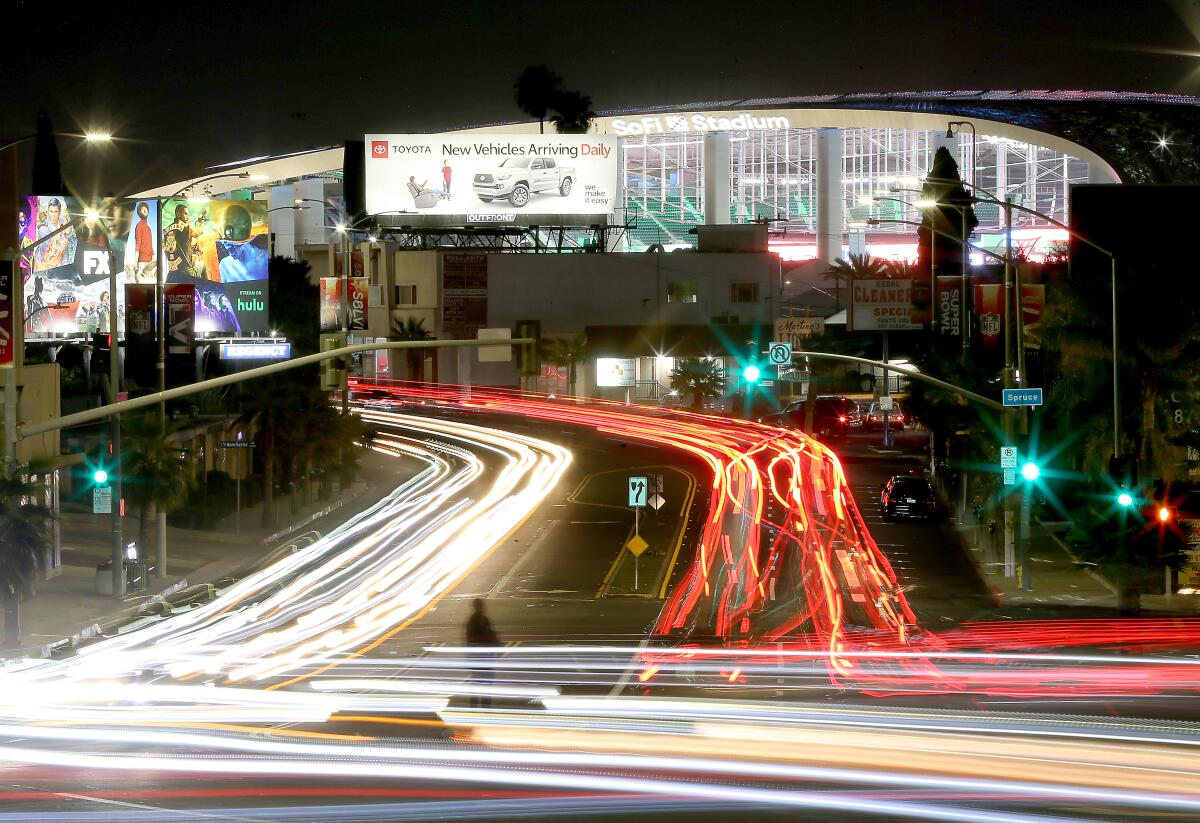Clippers and Rams owners come out against Inglewood people mover, as $2.4-billion project falters

Plans for a 1.7-mile proposed people mover that would drop Los Angeles rail riders off at the foot of SoFi Stadium have been upended after South Bay cities voted down a request for $493 million more to build the project, putting into jeopardy $1 billion of federal funding.
The $2.4-billion elevated rail line that Inglewood Mayor James Butts hoped to have open ahead of the 2028 Olympics is supposed to glide over the city’s downtown and lure tourists. But its rising cost and shifts in design have made it a difficult sell.
The early support of Rams owner Stan Kroenke and Clippers owner Steve Ballmer, who have invested billions to make the Los Angeles suburb an entertainment behemoth and been an ally of Butts, faded this year after designs emerged showing rail construction would cut into their property line. And the expected years-long construction and loss of a street lane outside the concert venues soured them.
Congresswoman Maxine Waters, another early supporter, recently opposed the “boondoggle” saying it wasn’t worth the money.
On Thursday night, a divided South Bay Cities Council of Government, a joint power authority of 16 cities that doles out money from Measure R and Measure M, two local half-cent sales tax measures for transit projects, rejected Butts’ request to cover the funding gap needed to pay for the project.
“Our city and all these cities that voted no. We get nothing,” said John Cruikshank, mayor of Rancho Palos Verdes, who objected to the high cost, along with leaders of El Segundo, Gardena, Hermosa Beach, Lawndale, Lomita, Manhattan Beach, Palos Verdes Estate, Rolling Hills, Rolling Hills Estate and Torrance.
“We’ve funded a huge portion of this already,” he said. “They were asking for even more. And to me, I just can’t see us giving anymore. It’s gonna tap us out.”
The vote marked a significant turning point for Butts, who rebuilt Inglewood and defied odds by creating a joint powers authority and coalescing official support and funds for the project in four years, a relatively short time in the transportation planning world. And while there is still time to pursue other funds — the reality of the project happening before the Olympics is disappearing.
Ahead of the vote, Butts said it would be “game over,” if Inglewood couldn’t secure the funding. But after, he seemed to hedge.
“I don’t give up on anything, but I am realistic,” he said. “It was voted down. So, for all intents and purposes, that’s it.”
Butts had sold the project as a “first-last mile connector” to SoFi Stadium, the Intuit Dome, Hollywood Park development, downtown Inglewood and other venues, arguing that it would bring people into Metro’s rail lines and solve congestion during games, concerts and other large events.
The three-stop people mover would connect to the K Line, creating a wider transit network for the growing rail system that the Metropolitan Transportation Authority is erecting. But opponents say it displaces businesses in downtown Inglewood and would be cheaper and more efficient to create dedicated bus lanes to and from the entertainment district.
The South Bay group has already committed $358 million to the Inglewood Transit Connector and more funds would have required them to create exceptions to their own rules that cap Measure R funding to any one project to $250 million. Their earlier round of funding avoided that cap by splitting the cost between the two Measures.
“There are not unlimited dollars,” executive director Jacki Bacharach told the board. She said Inglewood already gets about 35% of Measure R funds and this would have brought it to over half.
Paying to complete the Inglewood Transit Connector would take away resources from other South Bay projects and amount roughly to the average cost of 125 to 175 city projects such as intersection improvements, bike lanes and signal synchronization, she told the board.
The request would have created a complex funding structure and rejiggered the rules of funding for the group. Butts asked to reprogram money meant for highway projects and create a payback mechanism funded through a special tax district.
But his biggest obstacle came ultimately from its earliest supporters, who have sunk billions of dollars into the Los Angeles suburb, making it an entertainment juggernaut.
“We do not plan to give any land for free,” said Gerard McCallum II, a senior project manager for Ballmer and Kroenke. “Why? Because it threatens the future development. It threatens our parking. It threatens everything about these businesses.”
In a letter to Butts, Ballmer said construction from the Transit Connector could imperil some of the biggest sporting events set to be held.
“With the upcoming international events scheduled to arrive in Inglewood over the next few years, including the Super Bowl, the World Cup, NBA All-Star Game, and the Olympics, the proposal to partially close Prairie Avenue and Manchester for at least 36 months for construction, the loss of access at our driveways, the ripping up of our communication and utility infrastructure along Prairie, and the lane reduction, all mean local businesses as well as guests attending the events will be significantly impacted,” he wrote.
Butts told the board construction plans had not changed since the sports giants gave their original support. Prairie Avenue — where the connector is proposed to run along and which is the main route to SoFi, YouTube Theater, the Intuit Dome and Kia Forum — will not be closed, he said.
“There will be rolling closure of some lanes during construction period,” he said. “By the time the Olympics come around whether or not the train is operational, construction will be completed.”
Representatives for Los Angeles, Carson and Redondo Beach voted to support the project, along with the offices of two county supervisors representing the South Bay, both of whom sit on the Metro board with Butts.
Metro board chair and Supervisor Janice Hahn said that funding the Transit Connector would not endanger other South Bay projects, and that backing off could send a bad message to Washington down the line.
“When we come together as a region and support project, it sends a huge message,” she said. “They’re sending it to a region that can work together and can support each other, and that makes a difference for future funds.”
More to Read
Sign up for Essential California
The most important California stories and recommendations in your inbox every morning.
You may occasionally receive promotional content from the Los Angeles Times.











